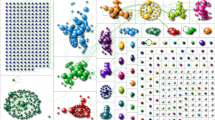Abstract
I-Help is a computer system that assists learners as they try to solve problems while learning a subject. I-Help achieves this by supporting a network of peersthat help each other out. One component ofI-Help selects appropriate peers to assist astudent, and then sets up a one-on-one peerhelp session between the helper and the helpee.The matching of helper to helpee takes intoaccount factors such as a potential helper'sknowledge of the topic of the helpee'squestion; their availability and eagerness tohelp; and their general helpfulness. Recentwork has developed a cognitive style componentto supplement these attributes, which enablesconsideration also of the suitability of ahelper's cognitive style for answering thehelpee's question. This paper describes howmodelling individuals' cognitive style canusefully supplement other user model data in apeer help network, and describes how thisinformation is obtained in I-Help.
Similar content being viewed by others
References
Baldwin, B.A. & Reckers, P.M.J. (1984). Exploring the role of learning style research in accounting education policy. Journal of Accounting Education2(2): 63–76.
Barker, T., Jones, S., Britton, C. & Messer, D. (2000). Individual cognitive style and performance in a multimedia learning application. Presented at EURO Education 2000 Conference. Aalborg, Denmark.
Brown, H.D. & Burke, R.C. (1987). Accounting education: A learning styles study of professional-technical and future adaptation issues. Journal of Accounting Education5: 187–206.
Bull, S. (1997). A multiple student and user modelling system for peer interaction. In R. Schäfer & M. Bauer, eds, 5 GI-Workshop, Adaptivität und Benutzermodellierung in interaktiven Softwaresystemen, pp. 61–71. Universität des Saarlandes. Online proceedings: http://w5.cs.uni-sb.de/abis97/proceedings/bull.ps
Bull, S. & Greer, J. (2000). Peer help for problem-based learning. In S.S. Young, J. Greer, H. Maurer & Y.S. Chee, eds, Proceedings of ICCE/ICAI 2000: Learning Societies in the New Millenium, Creativity, Caring and Commitments (Volume 2), pp. 1007–1015. National Tsing Hua University of Taiwan.
Bull, S., Greer, J., McCalla, G. & Kettel, L. (2001a). Help-seeking in an asynchronous help forum. In R. Luckin & B. du Boulay, eds, Proceedings of Workshop on Help Provision and Help Seeking in Interactive Learning Environments, pp. 9–21. International Conference on Artificial Intelligence in Education. Online proceedings: http://www.cogs.susx.ac.uk/ users/bend/aied2001/bull.pdf
Bull, S., Greer, J., McCalla, G., Kettel, L. & Bowes, J. (2001b). User modelling in I-Help: What, why, when and how. In M. Bauer, P.J. Gmytrasiewicz & J. Vassileva, eds, User Modeling 2001, pp. 117–126. Berlin Heidelberg: Springer-Verlag. Also available from: http://www.eee.bham.ac.uk/bull/papers/UM01.html
Clapp, R.G. (1993). Stability of cognitive style in adults and some implications, a longitudinal study of the Kirton adaption-innovation inventory. Psychological Reports73: 1235–1245.
Clarke, J. (1993). Cognitive style and computer-assisted learning: Problems and a possible solution. Association for Learning Technology Journal1(1): 47–59.
Cox, R. (1999). Representation, construction, externalised cognition and individual differences. Learning and Instruction9: 343–363.
de Kleer, J. (1986). An assumption-based truth maintenance system. Artificial Intelligence Journal28(2): 127–162.
Doyle, J. (1979). A truth maintenance system. Artificial Intelligence Journal12: 231–272.
Drew, P.J., Cule, N., Gough, M. Heer, K., Monson, J.R.T., Lee, P.W.R., Kerin, M.J. & Duthie, G.S. (1998). Optimal education techniques for basic surgical trainees: Lessons from education theory. Journal of the Royal College of Surgeons of Edinburgh44: 55–56.
Felder, R. (not dated). Index of Learning Styles (ILS). http://www2.ncsu.edu/unity/lockers/ users/f/felder/public/ILSpage.html. Accessed: 27th March 2001.
Ford, N. (1985). Learning styles and strategies of postgraduate students. British Journal of Educational Technology16(1): 65–79.
Greer, J. & Bull, S. (2000). Computer support for collaboration in medical education. Clinical and Investigative Medicine23(4): 270–274.
Greer, J., McCalla, G., Cooke, J., Collins, J., Kumar, V., Bishop, A. & Vassileva, J. (1998). The intelligent helpdesk: Supporting peer help in a university course. In B.P. Goettl, H.M. Halff, C.L. Redfield, V.J. Shute, eds, Intelligent Tutoring Systems, pp. 494–503. Berlin Heidelberg: Springer-Verlag.
Greer, J., McCalla, G., Vassileva, J., Deters, R., Bull, S. & Kettel, L. (2001). Lessons learned in deploying a multi-agent learning support system: The I-Help experience. In J.D. Moore, C.L. Redfield & W.L. Johnson, eds, Artificial Intelligence in Education, pp. 410–421. Amsterdam: IOS Press.
Groat, A. & Musson, T. (1995). Learning styles: Individualizing computer-based learning environments. Association for Learning Technology Journal3(2): 53–61.
Hoppe, H.U. (1995). The use of multiple student modelling to parameterize group learning. In J. Greer, ed, Proceedings of World Conference on Artificial Intelligence in Education, pp. 234–241. Charlottesville, VA: AACE.
Horvitz, E. (1997). Agents with beliefs: Reflections on Bayesian methods for user modeling. In A. Jameson, C. Paris & C. Tasso, eds, Proceedings of the Sixth International Conference on User Modeling, pp. 441–443. Wien, New York: Springer.
Huang, X. (1993). Inconsistent beliefs, attention, and student modelling. International Journal of Artificial Intelligence in Education3(4): 417–428.
Huang, X., McCalla, G.I., Greer, J.E. & Neufeld, E. (1991). Revising deductive knowledge and stereotypical knowledge in a student model. User Modeling and User-Adapted Interaction1(1): 87–115.
Kay, J. (1995). The UM Toolkit for cooperative user modelling. User Modeling and User-Adapted Interaction4: 149–196.
Kolb, D.A. (1984). Experiential Learning. Englewood Cliffs, NJ: Prentice Hall.
Kwok, M. & Jones, C. (1995). Catering for Different learning styles. Association for Learning Technology Journal3(1): 5–11.
Laurillard, D. (1979). The processes of student learning. Higher Education8: 395–409.
Lonka, K. & Lindblom-Ylänne, S. (1996). Epistemologies, conceptions of learning, and study practices in medicine and psychology. Higher Education31: 5–24.
McCalla, G., Vassileva, J., Greer, J. & Bull, S. (2000). Active learner modelling. In G. Gauthier, C. Frasson & K. VanLehn, eds, Intelligent Tutoring Systems, pp. 53–62. Berlin Heidelberg: Springer-Verlag.
McKay, E. (1999a). An investigation of text-based instructional materials enhanced with graphics. Educational Psychology19(3): 323–335.
McKay, E. (1999b). Exploring the effect of graphical metaphors on the performance of learning computer programming concepts in adult learners: A pilot study. Educational Psychology19(4): 471–487.
McKay, E. (2000). Measurement of cognitive performance in computer programming concept acquisition: Interactive effects of visual metaphors and the cognitive style construct. Journal of Applied Measurement1(3): 257–291.
Milne, S., Cook, J., Shiu, E. & McFadyen, A. (1997). Adapting to learner attributes: Experiments ising an adaptive tutoring System. Educational Psychology17(1-2): 141–155.
Moran, A. (1991). What can learning styles research learn from cognitive psychology? Educational Psychology11(3-4): 239–245.
Mühlenbrock, M., Tewissen, F. & Hoppe, H.U. (1998). A framework system for intelligent support in open distributed learning environments. International Journal of Artificial Intelligence in Education9(3-4): 256–274.
Newble, D.I. & Hejka, E.J. (1991). Approaches to learning of medical students and practising physicians: Some empirical evidence and its Implications for medical education. Educational Psychology11(3-4): 333–342.
Ogata, H., Sueda, T., Furugori, N. & Yano, Y. (1999). Augmenting collaboration beyond classrooms through online social networks. In G. Cumming, T. Okamoto & L. Gomez, eds, Advanced Research in Computers and Communications in Education - Proceedings of ICCE' 99, pp. 277–284. Amsterdam: IOS Press.
Pask, G. (1976). Styles and strategies of learning. British Journal of Educational Psychology46: 128–148.
Pillay, H. (1998). An investigation of the effect of individual cognitive preferences on learning through computer-based instruction. Educational Psychology18(2): 171–182.
Ramsden, P. (1979). Student learning and perceptions of the academic environment. Higher Education8: 411–427.
Ramsden, P. & Entwistle, N.J. (1981). Effects of academic departments on students' approaches to studying. British Journal of Educational Psychology51: 368–383.
Rich, E. (1983). Users are individuals: Individualizing user models. International Journal of Man-Machine Studies (18): 199–214.
Rich, E. (1989). Stereotypes and user modeling. In A. Kobsa & W. Wahlster, eds, User Models in Dialog Systems, pp. 35–51. Berlin: Springer-Verlag.
Riding, R. (1991). Cognitive Styles Analysis. Birmingham: Learning and Training Technology.
Riding, R. (1998). Cognitive Styles Analysis. Birmingham: Learning and Training Technology.
Riding, R.J. & Ashmore, J. (1980). Verbaliser-imager learning style and children's recall of information presented in pictorial versus written form. Educational Studies6(2): 141–145.
Riding, R.J., Buckle, C.F., Thompson, S. & Hagger, E. (1989). The computer determination of learning styles as an aid to individualized computer-based training. Educational and Training Technology International26(4): 393–398.
Riding, R. & Caine, T. (1993). Cognitive style and GCSE performance in mathematics, English language and French. Educational Psychology13(1): 59–67.
Riding, R.J. & Calvey, I. (1981). The assessment of verbal-imagery learning styles and their effect on the recall of concrete and abstract prose passages by 11 year old children. British Journal of Psychology72: 59–64.
Riding, R. & Cheema, I. (1991). Cognitive style - an overview and integration. Educational Psychology11(3-4): 193–215.
Riding, R. & Douglas, G. (1993). The effect of cognitive style and mode of presentation on learning performance. British Journal of Educational Psychology63: 297–307.
Riding, R.J., Glass, A., Butler, S.R. & Pleydell-Pearce, C.W. (1997). Cognitive style and individual differences in EEG alpha during information processing. Educational Psychology17(1-2): 219–234.
Riding, R. & Rayner, S. (1998). Cognitive Styles and Learning Strategies. London: David Fulton Publishers.
Riding, R. & Sadler-Smith, E. (1992). Type of instructional material, cognitive style and learning performance. Educational Studies18(3): 323–340.
Riding, R.J. & Watts, M. (1997). The effect of cognitive style on the preferred format of instructional material. Educational Psychology17(1-2): 179–183.
Sadler-Smith, E. & Riding, R. (1999). Cognitive style and instructional preferences. Instructional Science27: 355–371.
Soloman, B.A. & Felder, R.M. (1999). Index of Learning Styles Questionnaire. http://www2. ncsu.edu/unity/lockers/users/f/felder/public/ILSdir/ilsweb.html
Valley, K. (1997). Learning styles and courseware design. Association for Learning Technology Journal5(2): 42–51.
VanLehn, K., Niu, Z., Siler, S. & Gertner, A.S. (1998). Student modeling from conventional test data: A Bayesian approach without priors. In B.P. Goettl, H.M. Halff, C.L. Redfield and V.J. Shute, eds, Intelligent Tutoring Systems, pp. 434–443. Berlin Heidelberg: Springer-Verlag.
Vassileva, J., Greer, J., McCalla, G., Deters, R., Zapata, D., Mudgal, C. & Grant, S. (1999). A multi-agent design of a peer-help environment. In S. Lajoie & M. Vivet, eds, Artificial Intelligence in Education, pp. 38–45. Amsterdam: IOS Press.
Vivacqua, A.S. (1999). Agents for expertise location. Proceedings of the AAAI Spring Symposium on Intelligent Agents in Cyberspace, Stanford, CA.
Westman, A.S. (1993). Learning styles are content specific and probably influenced by content areas studied. Psychological Reports73: 512–514.
Winter, M. & McCalla, G. (1999). The emergence of student models from and analysis of ethical decision making in a scenario-based learning environment. In J. Kay, ed, UM99 User Modeling, pp. 265–274. Wien, New York: Springer.
Witkin, H.A., Moore, C.A., Goodenough, D.R. & Cox, P.W. (1977). Field-dependent and field-independent cognitive styles and their implications. Review of Educational Research47: 1–64.
Author information
Authors and Affiliations
Rights and permissions
About this article
Cite this article
Bull, S., McCalla, G. Modelling cognitive style in a peer help networkt. Instructional Science 30, 497–528 (2002). https://doi.org/10.1023/A:1020570928993
Issue Date:
DOI: https://doi.org/10.1023/A:1020570928993




